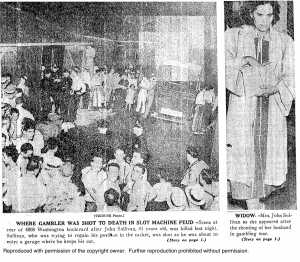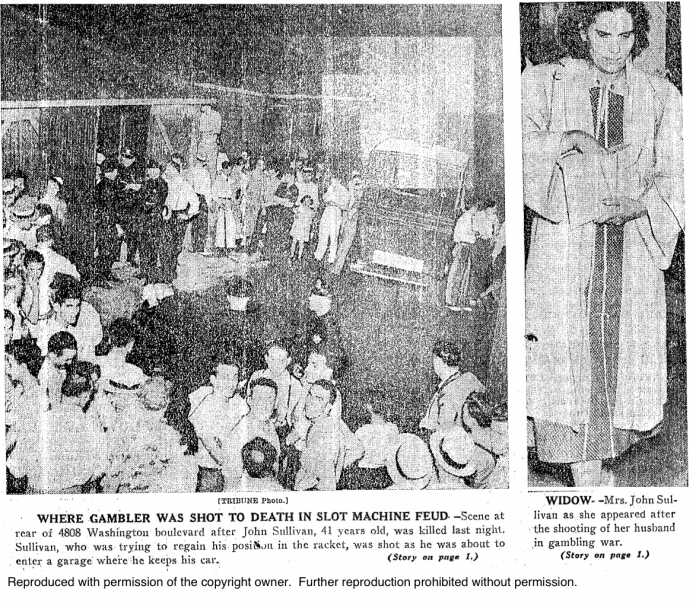
DEEP within every one of us lies an innate desire to connect with the past, to trawl through family trees, trace our heritage and learn more about those who preceded us. It was always thus. But, thanks to the Internet, and a world that grows smaller with every passing day, it is now easier to unearth the details of distant relatives.
As such, there is nothing all that remarkable about an American deciding to trace their Irish roots. It happens every day of the week, big deal. We all know that hundreds of thousands of Irish people descended upon US shores in the nineteen-hundreds and we all know that there are millions of second, third and fourth generation Irish living in the States as a result.
But when one of those normal, everyday searches into the archives reveals details of a pair of brothers embroiled in the Chicago crime scene during Al Capone’s reign of terror, then suddenly things get more interesting.
And when it emerges that those brothers were the grandchildren of a Limerick man who had emigrated to the States for a better life, and the children of a prominent member of the Chicago police force, then it becomes a story almost impossible to ignore.
Before we go back in time we should however return to the present day and to the person doing the searching.
Jim White is 75 years old and lives in Iowa City, Iowa. He has been tracing his Irish roots since 1980 and recently spent two weeks in County Waterford visiting relatives from his mother’s side of the family. It was a life-affirming experience, one Jim will never forget. After years of fruitless searching, years of frustration, he finally got to meet his Irish ancestors.
Stories were exchanged, pictures were shared, and pints were drank, but one question continued to crop up – and it had nothing to do with his mother or indeed anyone from her side of the family.
“What do you know about those Sullivan boys who got in trouble with the law?”
Jim had traveled all that way, at great personal expense, after more than 30 years of searching, and all anyone wanted to know about was the two rogues in Chicago.
Said rogues were his father’s half-brothers, John and Joseph Sullivan. Born in the late 1890s to Timothy Sullivan, the aforementioned policeman, the two brothers chose not to follow in their father’s footsteps. Much of this can be explained by Timothy’s death, to TB, when they were barely out of nappies, which was preceded by the death of their grandfather Andrew, a Limerick man who had escaped the famine by setting sail for North America in the mid 1860s.
Although their mother remarried (to a Mr George White, a Chicago plumber whose own father was born in St. Michael’s Chapel in Limerick city) the boys’ destiny had already been shaped.
In and out of young offender’s institutions from an early age, the brothers entered adulthood a pair of petty criminals. Specialising in burglary and grand larceny their exploits, somewhat inevitably, landed them in the local prison, Joilet Correctional Center.
From 1913 until their deaths, some twenty years later, the boys would drift in and out of prison spending more time inside than out.
But, over the course of time, the Sullivan men graduated from thieving and stealing to something far more sophisticated.
Becoming major players in Chicago’s gambling scene, they set up a slot machine racket, running more than 100 of the machines throughout the city. It’s worth noting that slot machines in 1930s America were big business, very big business indeed. Think Las Vegas at peak hours, and then multiply it by twenty. And, like drug dealing and prostitution, securing the best territory in which to work your machines was of paramount importance.
Unfortunately for the brothers this brought them into direct confrontation with a local mafia family called the Coppolas. Unhappy at seeing this pair of Irish upstarts muscle in on their real estate, the Coppolas sought to remove them, by fair means or foul.
Joseph Sullivan’s death was shrouded in mystery, his car run off the road in Cicero, Illinois, the hometown of the infamous Al Capone. Local police appeared reluctant to investigate the incident and Joseph’s assailants were never identified.
In prison at the time, John could only watch on in horror as his aunt, Alice Kett, reacted to Joseph’s death by selling their entire slot machine racket to the Coppola brothers for $700,000, a small fortune in those days.
Upon his release John confronted the Coppolas, demanding the return of his machines. Bringing the case all the way to the probate court John had succeeded in placing himself as the administrator of his dead brother’s estate when further tragedy struck.
Gunned down by a pair of unidentified men as he parked his car in his garage, John was killed on August 30, 1937, he was 41 years old.
The story made the front pages of the local papers, another gory detail in a decade of unprecedented violence.
Jim White’s father never knew his half-brothers, or any of the rest of his family for that matter. He, along with two sisters from his mother’s second marriage, were placed in St Vincent’s Orphanage in Chicago in 1907.

This goes some way towards explaining the difficulties Jim has faced in tracing his roots. But, thanks to the efforts of those at the Limerick Genealogy centre, he has traced those roots back to Limerick city. Both his great-grandfather and the grandfather of his notorious half-brothers hailed from the city, although given the feats of the latter, the city may be a little reluctant to claim them.
Jim has asked us that we include his email address so that anyone with an interest in this story can contact him directly: jjwhite499@yahoo.com








